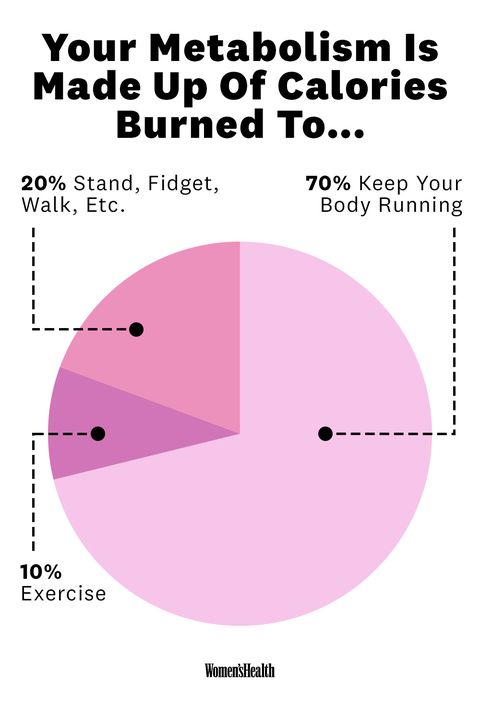Good News: Experts Confirm Sleeping More Can Totally Speed Up Your Metabolism

“Metabolism” is one of those buzz words that gets thrown around a lot.
Effortlessly thin people, for example, are often said to be blessed with “fast metabolisms.” And, the key to weight loss is to “boost your metabolism”…right?
Kind of. But that’s easier said than done, friend.
First things first: What exactly is your metabolism?
Basically, your metabolism is all the energy (a.k.a. calories) that you burn every day.
But burning calories doesn’t just happen when you exercise—you burn calories every minute as your body keeps you alive, says Abbie E. Smith-Ryan, Ph.D., CSCS*D, associate professor and director of the applied physiology laboratory at the University of North Carolina, Chapel Hill.
That means all of your body’s processes, voluntary or not, contribute to your metabolism—everything from digesting food to breathing to punching out a text message on your phone.
Your metabolism is made up of 3 factors.

Amanda Becker
It’s possible to make your metabolism work more efficiently.
So, yes, you can “boost” your metabolism, but it’s going to take work, starting with your diet.
Remember the part of your metabolism—your BMR—that burns calories just to keep you alive? Part of that is influenced by how much energy your body expends digesting the food that you eat—and some foods take more energy to digest than others.
Getting adequate protein and fiber can definitely help increase your metabolism.
“Protein burns more calories than carbs and fat,” explains Erik Bustillo, R.D., L/DN, CISSN, CPT.. About 30 percent of the calories in protein go toward its digestion and absorption, whereas that number is only about 10 percent for carbs, and even less for fats.
Fiber’s another nutrient that costs a little more energy, says Bustillo—so, getting adequate protein and fiber can definitely help maximize your BMR, and hence, your metabolism.
Of course, doesn’t mean you should shun fat and other carbs—you need a balance of all three to keep your body functioning properly.
Also important: While no vitamin or nutrient has the power to increase your BMR on its own, being deficient in any of the essential vitamins and nutrients can have a negative effect.
Another thing to keep in mind: Eating too little can actually slow down your metabolism.
This is known as metabolic adaptation, says Bustillo, but you might know it as your body going into “starvation mode.”
When you drastically reduce calories for an extended period of time, your body thinks it’s starving because there’s not enough food available. Its response is to hang onto every calorie by burning as few as possible—and the longer this happens, the further your BMR may drop.
“People who have yo-yo dieted all their lives may experience much difficulty losing weight later in life due to this metabolic adaptation,” says Bustillo.
That’s not to say that anyone with a history of extreme calorie restriction is doomed, though. “Take comfort in knowing the metabolism doesn’t just stop working, nor do we ever have a ‘bad’ metabolism” says Bustillo.
You can turn things around by simply amping up your daily intake by about 100 calories each week, until you’re within a healthy calorie range for your body.
Alcohol might also slow down your metabolism a bit. “Alcohol is registered as not good for the body upon consumption, which results in the body seeking to eliminate it as quickly as possible,” says Bustillo.
So, when you’re tipsy (and you order pizza), your body’s first order of business is to break down and get rid of the booze—leaving the pizza to sit around and turn into fat.
The other effective way to maximize your metabolism? Exercise.
“Evidence suggests that high-intensity interval training is one of the most advantageous forms of exercise,” says Smith-Ryan. “It burns more calories in half the time as steady-state cardio, and your calorie burn may remain elevated for up to 24 hours after exercise—as many as 200 to 300 calories on average, says Bustillo.
Muscle burns six calories per pound, while fat burns two calories per pound.
The other way that exercise can help boost BMR is by increasing muscle mass. “Resistance training is advantageous for increasing lean mass, which indirectly will increase [BMR],” says Smith-Ryan.
How? Because muscle tissue burns more calories at rest than fat tissue. “Previous data suggests about six calories per pound of muscle, versus two calories per pound of fat mass,” says Smith-Ryan.
That’s not a huge difference, and adding lean mass isn’t a magic bullet way to boost your daily calorie burn. But those extra four calories can cumulatively make a big impact over time, says Smith-Ryan
Just don’t overdo it.
Taking enough recovery time between workouts, and getting adequate sleep, are key, says Smith-Ryan, because it gives your muscles a chance to rebuild and your hormones a chance to return to their normal state.
The way you strength train matters too: “The most effective approach is to lift heavier loads,” says Smith-Ryan.
You’ll also need to eat more, which might mean setting aside weight-loss goals while you build up your muscle mass, says Smith-Ryan.
The bottom line: There’s no quick-fix way to boost your metabolism, but you can make small changes to your daily habits to help increase the amount of calories you burn each day.
From: Women's Health US
Source: Read Full Article


